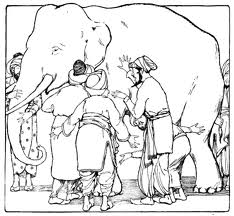50 Stories & Snippets for Conference & Workshop Presentations.
The Blind Men and the Elephant
It was six
men of Indostan
To learning
much inclined
Who went to
see the Elephant
(Though all
of them were blind)
That each by
observation
Might satisfy
his mind.
The First
approached the Elephant
And happening
to fall
Against his broad
and sturdy side
At once began
to bawl:
'God bless
me! but the Elephant
Is very like
a WALL!'
The Second,
feeling of the tusk,
Cried, 'Ho,
what have we here,
So very round
and smooth and sharp?
To me 'tis
mighty clear
This wonder
of an Elephant
Is very like
a SPEAR!'
The Third
approached the animal
And happening
to take
The squirming
trunk within his hands
Thus boldly
up and spake:
'I see,'
quoth he, 'the Elephant
Is very like
a SNAKE!'
The Fourth
reached out an eager hand
And felt
about the knee.
'What most
this wondrous beast is like
Is mighty
plain,' quoth he:
''Tis clear
enough the Elephant
Is very like
a TREE!'
The Fifth,
who chanced to touch the ear,
Said: 'E'en
the blindest man
Can tell what
this resembles most;
Deny the fact
who can,
This marvel
of an Elephant
Is very like
a FAN!'
The Sixth
no sooner had begun
About the
beast to grope
Than seizing
on the swinging tail
That fell
within his scope,
'I see,'
quoth he, 'the Elephant
Is very like
a ROPE!'
And so these
men of Indostan
Disputed loud
and long,
Each in his
own opinion
Exceeding
stiff and strong,
Though each
was partly in the right
And all were
in the wrong!
John Godfrey Saxe, US poet (1816-1887)
Using the poem
This classic poem and
various prose adaptations of the underlying parable have been used
metaphorically in a wide range of situations - from illustrating the
difficulties presented in medical diagnosis to discussing comparative religion
- but the common theme is a search for truth.
Use this poem to show how limited
observation, a particular experience, partial knowledge of a situation, or a
conditioned perspective can all affect one's viewpoint and possibly lead to
miscommunication, misunderstanding, misinterpretation or mistrust. Promote
discussion among your group by asking what the blind men of Indostan might have
done to resolve their dispute and reach a common understanding. What may come
out is the importance of seeing the bigger picture, of weighing all the
evidence before coming to a conclusion, and perhaps seeking objective advice
from an expert witness. The discussion may even widen to an exploration of the
nature of truth itself. Thus this simple witty verse lends itself both to
modest ends and, if you should wish, profound philosophical debate.
The Boulder
Noam in ancient times was a desperately
poor kingdom. People there blamed the king, comparing him to his grandfather who,
they said, ran everything so much more smoothly than this lax ruler.
Everything, it seemed, was better in the old days. In truth the young king
tried his best, but the day-to-day problems were more than he could handle
alone. He could not command support, and so the kingdom became poorer year by
year.
One morning a huge boulder appeared in
the middle of the road leading to the gates of the capital. Rich merchants and fashionable
courtiers grumbled as they walked around the rock, cursing the king for failing
to keep the roads clear and causing them to trail their cloaks in the ditch.
A peasant came along on his way to
market with a heavy sack of produce on his back. Seeing the boulder he set down
his burden and tried to move the rock to the side of the road. He strained and
struggled for over an hour under the hot midday sun. Townsfolk mocked as they
squeezed by the sweating peasant. Finally he succeeded and his red face broke
into a smile of relief and pride as the great rock rolled into the ditch.
Stepping back into the road to
retrieve his sack the peasant noticed a leather purse lying where the boulder
had been. Inside the purse he found a dozen gold coins and a note from the king
explaining that here was a reward for the person who cleared the rock from the
roadway.
As the peasant gazed in wonder the royal coach appeared, travelling
towards the city gates. The coach stopped and the king himself opened the door.
He invited the peasant to join him, and they rode through a throng of staring
citizens to the palace where they talked into the night of ways to save the
kingdom.
'The block of granite, which is an obstacle in the
pathway of the weak, becomes a stepping-stone in the pathway of the strong.'
Thomas Carlyle, Scottish essayist, historian (1795-1881)
Using the story
'It was much better
in the old days' is a common refrain in organizations and communities. The
tendency to hark back to some mythical golden age goes hand in hand with the
urge to blame someone for the present state of things, usually the people seen
as running the show.
Use this story to remind everyone
listening that they need to take responsibility for problems and challenges if
they are to make progress, rather than waiting for some higher authority to
come along with a solution. The story works well when used together with the
quotation from Thomas Carlyle as it reinforces the notion that every problem
comes with a gift in its hand, the opportunity for transformation.
More extracts to come, but if you can't wait or you want them all in one published collection you can download the book to your Kindle or Nook.


No comments:
Post a Comment